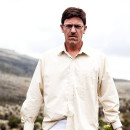Defiance
06.2.2009 | By Mack Chico |
Rated: R for violence and language.
Release Date: 2009-01-16
Starring: Clayton Frohman, Edward Zwick
Director(s):
Distributor:
Film Genre:
Country:USA
Official Website: http://www.defiancemovie.com/
For some reason, the Nazis are popular during the holiday season of 2008. They occupy central positions in Valkyrie and Good, flitter around the periphery of The Reader, and are rarely seen but very much present in Defiance. Edward Zwick’s adaptation of the true-to-life story of Nechama Tec’s book about the Bielski partisans, this movie is less about the struggle against the Nazis than it is about the fight for survival. Although there are battles, Defiance spends most of its time exploring the difficulties of surviving as fugitives in the midst of a Soviet winter.
The year is 1941 and the place is Belarus. Hitler is on the move pushing eastward and the Final Solution is underway. The four surviving Beilski brothers – Tuvia (Daniel Craig), Zus (Liev Schreiber), Asael (Jamie Bell), and Aron (George MacKay) – are forced to hide in the woods after the local police, in collaboration with the Germans, kill the rest of the family. But the Beilskis’ time on the run is not destined to be spent alone. Like moths to the flame, other Jewish refugees are drawn to them, until they are more like a dispossessed community than a ragtag group. The bigger the camp gets, the more problems arise. Tuvia and Zus openly clash, with the former advocating a largely peaceful philosophy and the latter wanting to get bloody. Disease, starvation, and cold threaten health and lives as the autumn deepens into winter. And the Germans are on the hunt, offering a reward and seeking the location where Tuvia and the Bielski partisans are holed up.
The principal flaw of Defiance is that some of the high-minded sentiments voiced by Tuvia in flowery speeches seem too noble and unrealistic for the circumstances. Also, while there’s nothing specifically wrong with Daniel Craig’s performance, it can be a little difficult accepting the actor as a Jew. One suspects Craig’s participation in the film might have been a concession to its getting the financing needed. After all, the rest of the cast is not populated by household names. Although Craig has the lion’s share of the screen time as well as the plum role, Liev Schreiber provides the most memorable performance – a forceful turn as the conflicted, least idealistic of the Beilski brothers.
The battle scenes are well choreographed and contain enough uncertainty to make them genuinely exciting, but one would expect no less from a man who has overseen Civil War engagements (Glory) and Japanese strife (The Last Samurai). More compelling, however, is the drama associated with the establishment and maintenance of the Bielski partisans’ refugee camp, situated deep in a forest during one of the most inhospitable times of the year. Not only are there problems with famine brought on by the inability to grow anything in the freezing cold, but an epidemic of typhus runs rampant through the community. Zwick re-creates each new crisis with immediacy and doesn’t bypass other less life-and-death elements of life: faith in God under such trying circumstances; love, sex, and marriage (three of the four brothers become emotionally connected to female refugees); and the friction that occurs between the Bielski group and other partisans in the area. The TV ads for Defiance make it seem like the movie centers on a series of guerilla attacks on the Nazis but, in reality, those moments are a small part of the wider tapestry Zwick has stitched together out of a combination of true history and dramatic license.
Defiance makes explicit the parallelism between a group of Jews fleeing from Nazi death squads and the Exodus. One rabbi prays that God will release the Jews from the curse of being the chosen people so they can stop running and being persecuted. However, the film runs the risk of overplaying its hand when one character remarks on the lack of supernatural intervention in parting the waters during a journey through swamplands.
Central to the film’s effectiveness is the transformation of Tuvia from idealist to pragmatist. While he never reaches the level of callousness and brutality displayed by Zus, events force him to reconsider the price of showing mercy. Craig handles the performance well enough for us to believe this character development, but this isn’t his best work (for my money, that can be found in either Layer Cake or Casino Royale). Ultimately, the film works not just because of the character arc it provides for its main character but for its ultimate theme of the triumph over adversity. In Exodus, Moses led the Hebrews out of captivity. Who would have suspected that in this tale, the role of Moses would be played by James Bond?
































